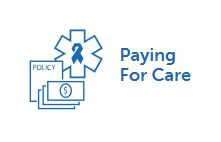Prostate cancer genetics
Is prostate cancer a hereditary cancer?
Inherited gene mutations are thought to play a role in about 10 percent of prostate cancers, including:
- BRCA1 and BRCA2: These tumor suppressor genes normally help repair mistakes in a cell’s DNA (or cause the cell to die if the mistake can’t be fixed). Inherited mutations in these genes more commonly cause breast and ovarian cancer in women, but changes in these genes (especially BRCA2) also account for a small number of prostate cancers.
- CHEK2, ATM, PALB2, and RAD51D: Mutations in these other DNA repair genes might also be responsible for some hereditary prostate cancers.
- DNA mismatch repair genes (such as MSH2, MSH6, MLH1, and PMS2): These genes normally help fix mistakes (mismatches) in DNA that can be made when a cell is preparing to divide into 2 new cells. Men with inherited mutations in one of these genes have a condition known as Lynch syndrome and are at increased risk of colorectal, prostate, and some other cancers.
- RNASEL (formerly HPC1): The normal function of this tumor suppressor gene is to help cells die when something goes wrong inside them. Inherited mutations in this gene might let abnormal cells live longer than they should, which can lead to an increased risk of prostate cancer.
- HOXB13: Mutations in this gene, which is important in the development of the prostate gland, have been linked to prostate cancer diagnosed at a young age that runs in some families. Fortunately, this mutation is rare.
Source: “What Causes Prostate Cancer?” (American Cancer Society, 2019)
Hereditary genes
Other genes involved in prostate cancer
Disparities in prostate cancer genetics?
About 5% to 10% of breast cancer cases are thought to be hereditary, meaning that they result directly from gene changes (mutations) passed on from a parent. The most common cause of hereditary breast cancer is an inherited mutation in the BRCA1 or BRCA2 gene.
Recent news about disparities in genetic mutations
Breast cancer genetic testing
Get Genetic Counseling Before Testing
How is genetic testing done?
Susan G. Komen says its “My Family Health Portrait” is an internet-based tool that’s easy to access on the web and simple to fill out and should only take about 15 to 20 minutes to build a basic family health history. It assembles your information and makes a “pedigree” family tree that you can download and share with family members or send to your health care practitioner. It is private–it does not keep your information.
Genetic testing after a prostate cancer diagnosis
Paying for genetic testing
Insurance coverage for genetic counseling and testing
 Most health plans cover genetic counseling and testing for inherited gene mutations linked to cancer in people who meet the national guidelines. The cost of testing and your out-of-pocket charges may vary based on several factors. People who are denied coverage for genetic testing can file an appeal (FORCE has sample appeal letters). About half of appeals are approved.
Most health plans cover genetic counseling and testing for inherited gene mutations linked to cancer in people who meet the national guidelines. The cost of testing and your out-of-pocket charges may vary based on several factors. People who are denied coverage for genetic testing can file an appeal (FORCE has sample appeal letters). About half of appeals are approved.
Medicare and Medicaid
Genetic counseling and testing is typically covered by Medicare for people already diagnosed with cancer who are in treatment or for whom test results may affect their care. Most state Medicaid programs cover genetic testing for BRCA and Lynch Syndrome mutations for people who meet requirements, which vary by state. You can read more about Medicare and Medicaid coverage of genetic testing here.
Financial assistance or low cost genetic testing
JScreen is a national program based out of Emory University in Atlanta that provides discounted at-home genetic counseling and testing with financial assistance available. Many laboratories offer low-cost genetic testing or financial assistance programs. Programs vary, so if you are not eligible for assistance through one lab, consider contacting other labs to see if you qualify. For more information, see “Paying for Care” on the FORCE website.
Disparities in breast cancer genetic testing?
Racial Disparities Persist in Genetic Testing
About 5% to 10% of breast cancer cases are thought to be hereditary, meaning that they result directly from gene changes (mutations) passed on from a parent. The most common cause of hereditary breast cancer is an inherited mutation in the BRCA1 or BRCA2 gene.
